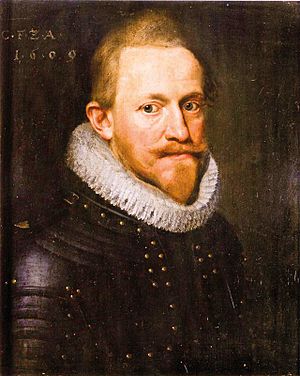Christian I, Prince of Anhalt-Bernburg facts for kids
Quick facts for kids Christian I |
|
|---|---|
| Prince of Anhalt-Bernburg | |
 |
|
| Christian of Anhalt, 1609 | |
| Spouse(s) | Anna of Bentheim-Tecklenburg |
| Issue | |
|
|
| Noble family | Ascania |
| Father | Joachim Ernest, Prince of Anhalt |
| Mother | Agnes of Barby-Mühlingen |
| Born | 11 May 1568 Bernburg |
| Died | 17 April 1630 (aged 61) Bernburg |
Christian I, Prince of Anhalt-Bernburg, also known as Christian of Anhalt, (born May 11, 1568 – died April 17, 1630) was an important German prince. He belonged to the House of Ascania, a very old noble family. He ruled the area of Anhalt and later, from 1603, became the prince of Anhalt-Bernburg. Christian was also a key advisor to Frederick IV, Elector Palatine, a powerful ruler. He was known for his skills as a diplomat and his strong support for the Calvinist faith.
Contents
Life of Christian I
Christian was born in Bernburg in 1568. He was the second son of Joachim Ernest, Prince of Anhalt. From a young age, he received a good education. Starting in 1570, he learned Latin, Italian, and French.
Even as a child, Christian went on important trips for his family. He traveled to places like Constantinople, which is now Istanbul. These experiences helped him become a skilled diplomat. He was very ambitious and good at dealing with people from other countries.
Early Career and Beliefs
In 1586, Christian went to Dresden. He became a close friend of Christian I, Elector of Saxony, who was also a ruler. They both shared similar religious beliefs, favoring Calvinism.
Christian took over his family's lands in December 1586. He remained a strong Calvinist throughout his life. He later became a trusted advisor to Frederick IV, Elector Palatine. In 1591, he led the Palatine army to help the French king, Henry IV.
In 1592, a conflict called the Bishops' War started. It was about who would control the bishopric of Strasbourg. Christian supported Brandenburg against Lorraine. In 1595, Frederick IV made him Governor of the Upper Palatinate. Christian then moved to the town of Amberg.
Ruling Anhalt-Bernburg
In 1603, the principality of Anhalt was officially divided. Christian received the area of Bernburg. This brought back the old principality of Anhalt-Bernburg, which had not existed since 1468.
As a diplomat, Christian played a big part in forming the Protestant Union in 1608. This was a group of Protestant states that joined together. After Elector Frederick IV died, Christian continued to serve his son, Frederick V.
Role in the Thirty Years' War
Christian was put in charge of the Protestant forces. His job was to defend Bohemia. This was against Holy Roman Emperor Ferdinand II and his allies. The Bohemian nobles had chosen Frederick V as their new king in 1619.
In the same year, Christian joined the Fruitbearing Society. This was a group of German nobles who promoted the German language and culture.
However, the Bohemian forces were defeated at the Battle of White Mountain in 1620. Christian advised Frederick V not to try and hold Prague. In 1621, because he had supported Frederick V, Christian was declared an outlaw. This meant he lost his lands and his rights within the Holy Roman Empire.
Christian had to flee. He first went to Sweden. Then, he became a guest of King Christian IV in Denmark. In 1624, he asked Emperor Ferdinand for forgiveness. He was allowed to return to his principality. Christian I died there six years later, in 1630.
Marriage and family
On July 2, 1595, Christian married Anna of Bentheim-Tecklenburg. She was born in Bentheim in 1579 and died in Bernburg in 1624. They had many children together.
Some of their notable children include:
- Christian II, Prince of Anhalt-Bernburg
- Eleonore Marie
- Frederick, Prince of Anhalt(-Bernburg)-Harzgerode
Christian's son Ernest was a colonel in the army. He was badly wounded in the Battle of Lützen (1632) and died.
See also
 In Spanish: Cristián I de Anhalt-Bernburg para niños
In Spanish: Cristián I de Anhalt-Bernburg para niños
 | Emma Amos |
 | Edward Mitchell Bannister |
 | Larry D. Alexander |
 | Ernie Barnes |

